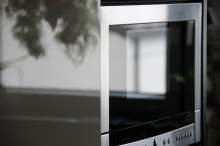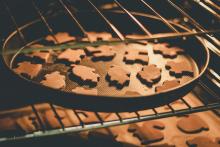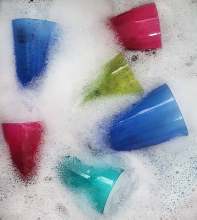How to make your kitchen eco-friendly
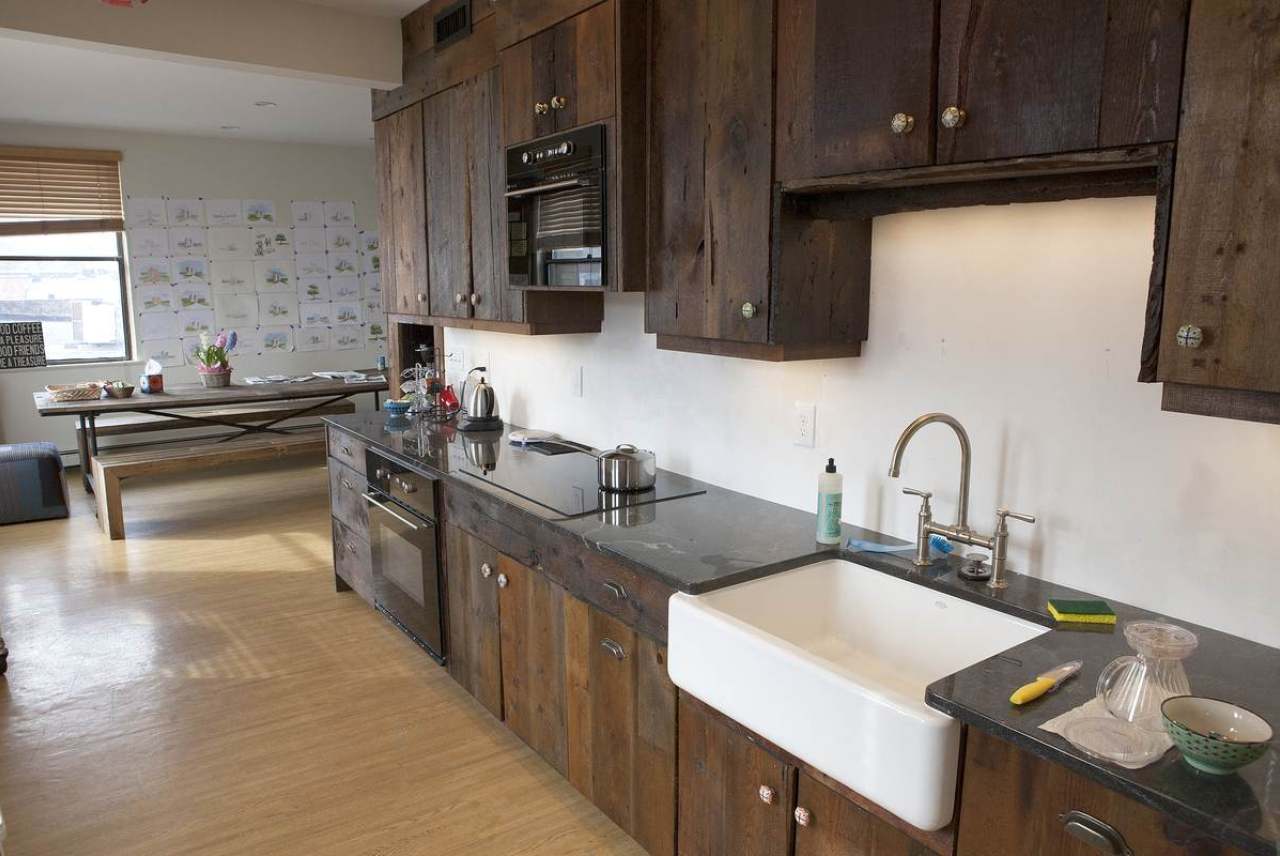
The kitchen is arguably one of the most important rooms in a house. However, from energy-guzzling white goods to cleaners that contain toxic ingredients, the average kitchen can have quite an impact on the environment.
Fortunately, making your kitchen that little bit better could only be a matter of small consumer choices. This guide is all you’ll need to create your very own eco-friendly and ethical kitchen.
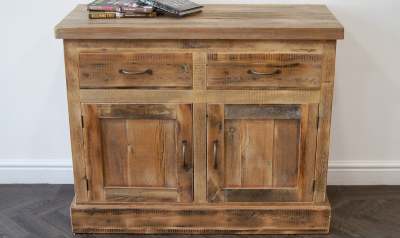
Many ethical issues arise from the production of furniture, particularly in relation to timber, cotton, leather and toxic flame retardants. A lot of kitchen furniture, like base units and worktops, is made of wood. It might shock you to know that in 2017, the rate of deforestation globally was such that every second more than one football pitch of forest was destroyed.
However, sustainable forestry has the potential to be a positive industry, particularly in relation to the environment. The wood that you have in your home is storing carbon and preventing it from spilling out into the atmosphere. Also, as a natural product, at the end of its lifetime wood will biodegrade, causing minimal damage to the environment as long as it has not been treated with toxic chemicals. So although it’s not always sourced sustainably, wood is a better option for kitchen furniture than plastic or metal.
A bit about the companies...
There were twelve companies who were considered to have a best timber sourcing policy, as illustrated in the Timber Sourcing table on our Furniture Shops Guide. Of particular note is IKEA, the only company with a timber sourcing policy that met all ten of Ethical Consumer’s necessary criteria. B&Q also had an extremely strong timber sourcing policy, as did Marks & Spencer and J Sainsbury Plc.
However, our Best Buy company, Green Woods Furniture, held reclaimed and recycled wood at its heart, which is a sustainable solution to buying new, poorly-sourced timber. Myakka Furniture also got a Best Buy status as a business that focuses on providing Fair Trade goods. Myakka also boasts a reclaimed furniture range. Lastly, although Barker and Stonehouse received our worst rating for its timber sourcing policy, 20% of its dining and bedroom ranges were made from reclaimed wood.
For a full rundown of the companies with the best timber sourcing policy and to find out more about ethical furniture, head to our Furniture Guide.
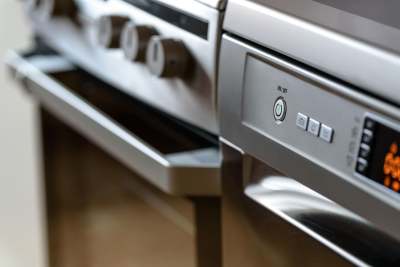
Ethical cookers
In terms of electricity alone, cooking (including that with an electric hob, electric oven, microwave and kettle) used approximately 6% of the household total for the whole of the UK.
Thanks to a reduction in the carbon intensity of the UK’s electricity, the average CO2 emitted by electric ovens and hobs has been falling and is predicted to continue falling. However, it is still better for the environment to have a gas cooker than an electric one. As for hobs, it may very well be time to consider induction hobs as the most environmentally friendly option.
Induction works by applying electromagnetism to pans with a high iron content (i.e. not ceramic, glass or aluminium). This effectively directly heats the pan and not the hob surface, and they switch off immediately when a pan cannot be detected.
Studies have found that “traditional ovens are among the most inefficient appliances, with an energy efficiency of around 10-12% with respect to the input power.” Our ovens waste energy on heating empty space and heat is lost because of air flow and ventilation.
Using your oven and hob efficiently
When using an oven:
-
Think carefully about how you reheat food. Microwaves are 60-80% more efficient than ovens.
-
Cook as much as possible in one go to make sure all the space and heat is being used.
-
Keep the oven closed while cooking as each time you open the door the oven loses heat and requires more energy to get back up to temperature.
-
Defrost frozen food in the fridge overnight to reduce the cooking time.
-
Whenever possible use the fan assist cooking option that allows you to set the oven at a lower temperature.
-
For longer cooking cycles, you can switch off the oven 10 minutes before the end of the cooking time and use the residual heat to finish cooking.
-
Maintain the seal on your oven.
-
Glass and ceramic dishes are the most efficient for ovens
When using a hob:
-
Copper-bottomed or cast-iron pans heat more effectively than stainless steel.
-
When possible use a steamer to cook multiple veggies at the same time.
-
Cut food into smaller pieces so it will cook more quickly.
-
Use the right sized pan. According to SmarterHouse, a 6” pan on an 8” electric ring wastes more than 40% of the heat produced by the ring.
A bit about the companies...
Cooking appliances can now achieve a top rating of A++. Very few products have been awarded this rating. In fact, we only found two ovens on sale in the UK with an A++ label, one from AEG and one from Grundig, both of which gain a Product Sustainability mark in this guide. Although the vast majority of cookers achieve at least an A rating, we hope that in the coming years companies give more emphasis to energy efficiency.
Tax avoidance had a huge impact on ethical ratings, however. Our Best rated brand for cookers was Miele which got a middle rating for tax avoidance, and which only makes electric built-in ovens and gas or electric hobs. For more recommendations and to see who provides induction hobs as well as the full rankings table see our Gas and Electric Cookers Guide.

Ethical fridge freezers
If you’re planning on getting an ethical fridge freezer, you might want to think about energy ratings. Since fridges are becoming increasingly efficient, getting a new one is your best bet.
The average 2013 fridge had half the lifecycle energy footprint of one bought in 2000. Getting a newer model of fridge freezer with the best energy rating will not only reduce its carbon emissions but will also cost you less to run per year.
Using your fridge and freezer efficiently
A survey showed that the average temperature of UK fridges was about 7°C. Although ethical consumers would do well not to set their fridge temperatures to excessively low temperatures, they would do just as well to think about food-waste when doing so.
Wrap argues that reducing them to 4°C could add an average of about 3 additional days of storage life to perishable foods like vegetables and meat, potentially reducing the amount thrown away. While the trade-off between temperature and food wastage remains murky, room temperatures remain important to take into account. As Appropedia suggests, if you keep your kitchen cooler it may have an impact on energy use as your fridge will have to work less hard to store your food.
You could also use your freezer to an ethical advantage. Cooking food in bulk and freezing is a great way to reduce food waste.
A bit about the companies...
Our only Best Buy fridges and freezers were A+++ models from Miele. The recommended buys for fridges and freezers are also A+++ models. To find out which brands sell these models and to see why they didn’t quite manage Best Buy ratings, head to our Guide to Fridges & Freezers.
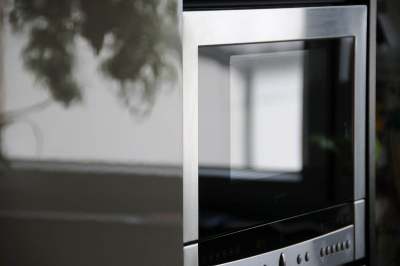
Ethical microwaves
Microwaves are not often seen as ethical kitchen appliances. Not a single microwave company from our shopping guide to Microwaves has an adequate policy to prevent the sourcing of conflict minerals for their products, and they have all failed to remove a number of highly toxic substances from their production lines.
Despite this, in terms of energy efficiency, microwaves can be better than ovens. For heating smaller portions of food, it is definitely better to use a microwave than a conventional oven as it can be around 80% more efficient.
However, it is worth noting that whilst microwaves are more efficient than ovens, the difference decreases as the amount of food increases. It also depends on whether your oven is gas or electric (see above). Furthermore, cooking using the most efficient methods may not impact much on a household’s overall energy usage.
In the UK, cooking amounted to 6% of total electricity use within the home in 2018. (Space heating accounted for 59%). A recent study suggested that the energy used to manufacture a microwave is about a fifth of its total lifetime energy use, so even though microwaves can sometimes be more efficient than ovens, they might not be worth the energy and resources that they take to make.
This is more important to consider now than it ever has been in the past, as the lifespan of a microwave has halved. Over the last twenty years, it has fallen from around 15 years to around 8 years.
As a result, when your microwave next dies, you might want to consider whether you could live without one or whether you could buy one second hand.
A bit about the companies...
For those looking for new microwaves, it is good to consider that Miele was our microwave brand Best Buy. For more recommendations and the full rankings, see the Microwave guide.
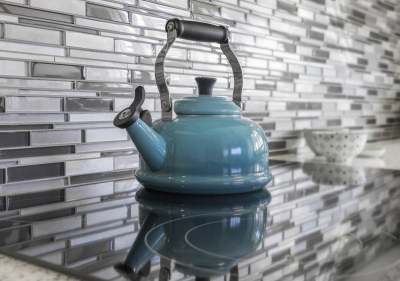
Ethical kettles
Most of the kettle companies that we covered in our guide paid little regard to ethical issues. They had few ethical policies in place in most areas. Hob kettle makers tended to score higher as they were smaller companies. There are other ways in which the kind of kettle that you buy matters, however.
With an electric kettle or hob kettle for induction hobs, there’s very little heat loss. With a kettle on the gas stove, however, energy is wasted heating up the body of the kettle and bits of the stove.
But an electric kettle or hob kettle used on an electric hob is worse in terms of the cost of electricity and CO2 generated by electricity production. That is of course unless you generate your own electricity at home or use a renewable electricity supplier. It's swings and roundabouts in gas vs electric.
The number one way to improve the energy efficiency of kettles is to stop overfilling them. It is really important to only boil the amount of water you actually need. This is unless you have an insulated kettle that can keep any excess water hot.
Insulated kettles are essentially thermos flasks and kettles combined. Vektra guarantees that the water will stay hot for up to 4 hours after it is first boiled. Testing has shown that after 2 hours the water is at 80°C, hot enough to brew a cup of tea, and after 4 hours will be at 68°C. Because less energy is lost through the body of the kettle, an insulated kettle also uses less energy to boil than a standard kettle. This makes them one of the most ethical kitchen appliances.
A bit about the companies...
Although they weren't awarded Best buy statuses, the hob kettle companies that topped our ethical scoreboard are Kitchencraft hob kettles, Le’Xpress hob kettles and Masterclass hob kettles. These brands were closely followed by Vektra insulated electric kettles. To find out more about this and to see who fell behind in the rankings, see our Kettles guide.
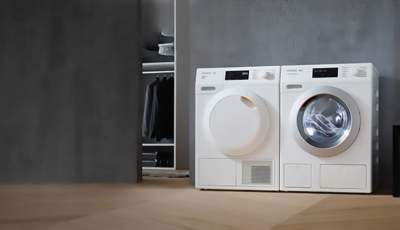
Ethical dishwashers
Studies tend to conclude that dishwashers are more eco-friendly than washing up by hand. Modern dishwashers can be so efficient with their use of hot water that they can beat all but the most frugal of washer-uppers. This includes the energy used to manufacture the machine, which accounts for less than 10% of that used over the lifetime of the product.
However, it is worth noting that all the studies show that the amount of energy and water used depends a lot on how you do the job. Most importantly, they find a huge variation in how much hot water people use to wash up by hand. Modern dishwashers use about 10 litres of water per cycle. Make sure to get one with an A+++ rating for efficiency if you decide to get one and don't use the air drying cycle.
A bit about the companies...
Four companies accounted for almost 75% of dishwasher sales in 2016. 30% were from BSH Home Appliances (Bosch, Siemens, Neff and Gaggenau), 18% were from Whirlpool (Whirlpool, Hotpoint, KitchenAid, Maytag and Indesit), 14% from Electrolux (Electrolux, AEG and Zanussi), and 12% from Beko (selling Koç Group brands Beko, Blomberg, Flavel, Grundig and Leisure).
All of these best-sellers are in the bottom half of our Ethiscore table. All four company groups received a worst rating for supply chain management, and for their lack of conflict minerals policies and all lost a whole mark for anti-social finance for having high-risk subsidiaries in jurisdictions considered to be tax havens.
Miele is our best-rated brand for dishwashers.
To see the rest of our Best and recommended buys, have a read of our Guide to dishwashers.

Ethical kitchen cleaning products
There’s no denying that everyone wants a spotless kitchen, but how can you have this and a clear conscience? The answer is relatively easy, you just need to phase out those toxic chemicals.
One of the best ways to avoid the long list of toxic chemicals that goes into many off-the-shelf detergents and washing up liquids, you could make your own. Our guides to dishwasher detergent and washing-up liquid detail that Dri Pak sell ingredients like bicarbonate of soda and borax substitute so that you can do this, and they also tell you how to make them.
A bit about the companies...
In our guide to household cleaners there are several certified ethical solutions in the household cleaner department. Greenscents, Bentley Organics and Bio D are just another few of them.
To see the rest of our Best and recommended buys, have a read of our Guide to Household Cleaners.
So there you have it, a brief rundown of how you can upgrade your kitchen and make it more ethical. Do you have any ethical kitchen lifehacks? Feel free to tweet us @EC_magazine using the hashtag #MyEthicalKitchen.
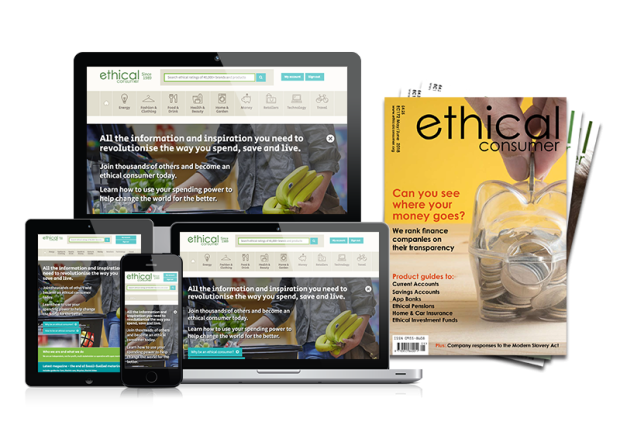
Start your 30 day trial today!
Ethics made easy - comprehensive, simple to use, transparent and reliable ethical rankings. Subscribe today for a wealth of data at your fingertips.
We will take payment when you order, but you can cancel by phone or email within 30 days for a full no-questions-asked refund!
